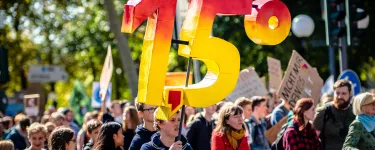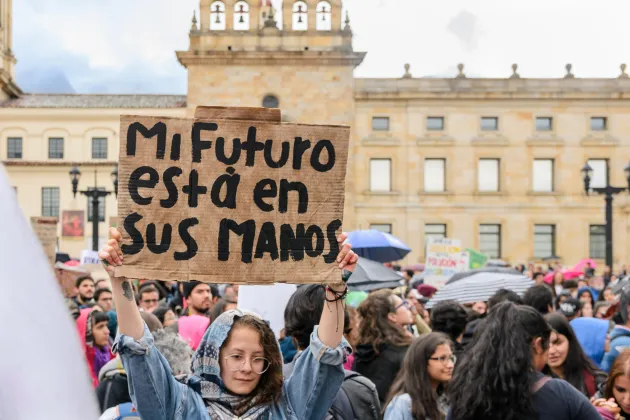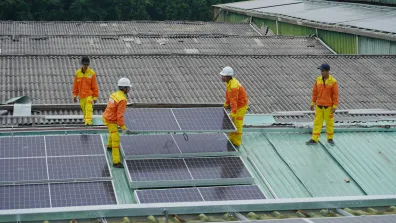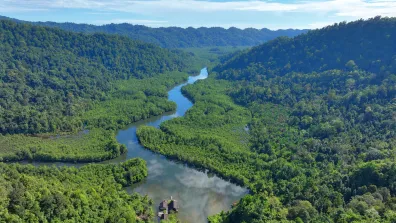COP26: Demanding justice for the Global South

Climate scientists have issued a code red warning for humanity as killer droughts, floods, fires and famines devastate the lives and livelihoods of millions. Preventing runaway catastrophic climate breakdown, which would leave many struggling to survive, requires temperature rises to be capped at the crucial point of 1.5°c.
For decades, the rich governments that have been most responsible for causing the crisis, and have amassed huge wealth from heavily polluting activities, have refused to do their fair-share to reduce emissions. Global North governments are now seeking to shift the burden onto the poorest countries, failing to meet their promises on climate finance,[1] whilst continuing to pollute and exploit the planet’s resources — gambling our future on risky and unproven technologies.[2] This approach risks turning entire ecosystems, communities and cities into sacrifice zones.
A climate summit during a pandemic
The summit takes place in the midst of the ongoing Covid-19 pandemic and a vaccine ‘apartheid.’ In some Global South countries, only 1% of citizens have been vaccinated. This is a direct result of rich countries such as the UK, US, Norway, Switzerland, the EU countries and others prioritising the profits of big pharmaceutical companies ahead of peoples’ lives and health, by refusing to waive patents.
Estimates show close to 10 million people have died from Covid-19, and hundreds of millions more have been left with life changing impacts. The pandemic has overwhelmed the ability of many countries to protect their citizens, and this has compounded the impacts of decades of policies imposed by rich countries such as debt conditionality, forced privatisation and austerity. This has allowed corporations to amass considerable wealth and power while rolling back workers’ rights.
Debt repayments, unfair global tax systems, and illicit capital flows have taken much needed money away from poorer countries, preventing them from investing in essential public services, health systems and social protection measures, leaving many unable to protect the lives and livelihoods of their citizens.
With hundreds of millions of jobs already lost and many more at risk, the most vulnerable are being pushed into extreme poverty, and global inequality is continuing to rise. At the same time the richest billionaires have seen their wealth increase by $5.5 trillion in the last year alone.
Global South countries have been denied the very tools used by rich countries to protect their economies in the global recession triggered by the pandemic. They have been forced to take on yet more debt creating loans, with the International Monetary Fund (IMF) insisting that global South countries commit to the failed policies of austerity cuts and increased corporate-led resource extraction, at the very moment they need to be investing to protect their citizens from the compounding crises of climate change, Covid-19 and deepening levels of inequality.
Continuing with the same global economic systems is not an option. We must meet the UN Climate Summit with a rallying cry that challenges the impacts of the climate crisis, make bold commitments to protect the planet and ensure the poorest are not sacrificed, and achieve an equitable and just transition.
The UK: A failure of climate leadership
At a very basic level, the UK has failed to ensure that the most affected countries will be properly represented at the COP26 Summit. Many delegates from developing country’s governments, as well as civil society observers, have effectively been prevented from attending the Climate Summit by the mismanagement of the Covid crisis and by visa entry requirements. The UK has failed to put in place the plans needed to facilitate effective participation and to set an ambitious agenda.
Instead, the UK has approached hosting COP26 as a major PR opportunity for the government to appear as a “world leader” post-Brexit. The UK vision for COP26 is primarily concerned with securing a positive image for itself rather than the best possible outcome from the negotiations. Despite the tough talk on climate, the UK is failing to meet its own weak targets[3] for cutting pollution, refusing to put in place the ambitious plans needed, continuing to expand fossil fuel use and enacting destructive policies that protect the interests of big business and the City of London.
The main objective of the UK strategy is to corral countries into “following the lead” of the UK and announce a target of net zero emissions by 2050. But the concept of so-called ‘net zero’ is deeply inequitable and does not meaningfully contribute to the reductions necessary to limit warming to 1.5C.[4] ‘Net zero’ does nothing to shift reliance on extracting and burning fossil fuels. It is an approach that relies on “off-setting” carbon released into the atmosphere rather than keeping fossil fuels in the ground. ‘Net zero’ schemes enable the countries and corporations most responsible for causing the climate crisis to avoid responsibility and their fair-share of effort and reparation, and risks green-washing their business as usual approach. Membership of this “net zero club” is being used as a benchmark for whether a country is a “leader”.
The UK government has also said that progress on “coal, cars, cash and trees” will be the yardstick to judge the success of the COP26 Summit. In reality, for any COP to succeed, countries must put people and the planet before profit by committing to a more radical approach; a Global Green New Deal. That means a justice transition that uproots the systems of injustice and oppression that have created these crises.
Tackling the crisis: our demands
To tackle the urgency of the climate crisis — COP26 at a minimum must commit to:
-
Fighting for 1.5c and real zero targets
Rich countries must do their fair-share of effort and commit to real zero targets by 2030 with real zero targets for developing countries by 2050.
-
Delivering the $100 billion in climate finance, and more...
Rich countries must deliver the $100 billion a year in new and additional public finance that they have promised — and commit to a new finance goal based on the real needs of those facing climate breakdown. The realistic cost of addressing the climate crisis is in excess of $1 trillion annually.
-
A Global Goal on Adaptation
Countries must agree a Global Goal that supports poorer countries with planning and implementation to adapt to the changing climate, and ensure adequate financial and technological support is made available.
-
Reparations for climate damages
Rich countries must agree to provide additional public finance in compensation to those bearing the brunt of losses and damages from climate breakdown today, to help them recover and rebuild their lives.
-
Invest in real de-carbonisation solutions
Countries must abandon the false solution of carbon offsetting and carbon markets and instead commit to advance the real solutions needed via non-market cooperative approaches.
-
A Global Green New Deal for a Justice Transition
Countries must commit to establishing a justice transition pathway that meets the urgent need to act, whilst leaving no one behind, through a global framework of cooperation and solidarity. To achieve this, they must commit to providing the trillions needed to guarantee everyone the right to live with dignity.
As world leaders negotiate, any commitments and outcomes from COP26 should be tested against four core measures:
A. Does it keep us below 1.5C?
B. Does it allow us to thrive within planetary boundaries?
C. Does it undo historical injustices, inequality and power imbalances?
D. Does it help build a society of care and repair, where everyone has the right to a dignified life?
These tests underscore the global, unjust, and interconnected nature of the crises we face, and the importance of internationalism, equity, and systems thinking in the solutions that are put forward.
Unless justice for the Global South is brought to the heart of the discussion, the resulting policies and actions will fall far short of those needed to tackle the climate crisis, and COP26 will have resulted in the same disregard for those whose lives and livelihoods are most at risk.



